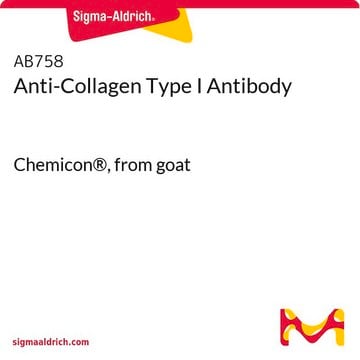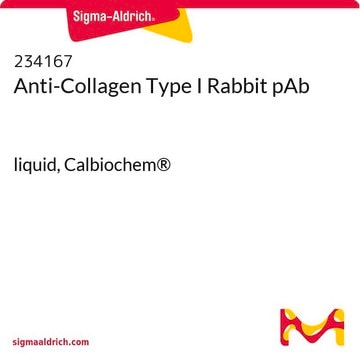ABT123
Anti-Collagen Type I (COL1A1) Antibody
rabbit polyclonal
Sinonimo/i:
Collagen alpha-1(I) chain, Alpha-1 type I collagen
Scegli un formato
Scegli un formato
About This Item
Prodotti consigliati
Nome del prodotto
Anti-Collagen Type I Antibody, from rabbit, purified by affinity chromatography
Origine biologica
rabbit
Livello qualitativo
Forma dell’anticorpo
affinity isolated antibody
Tipo di anticorpo
primary antibodies
Clone
polyclonal
Purificato mediante
affinity chromatography
Reattività contro le specie
mouse, rat
tecniche
ELISA: suitable
immunohistochemistry: suitable (paraffin)
western blot: suitable
N° accesso NCBI
N° accesso UniProt
Condizioni di spedizione
wet ice
modifica post-traduzionali bersaglio
unmodified
Informazioni sul gene
human ... COL1A1(1277)
Descrizione generale
Immunogeno
Applicazioni
Cell Structure
Adhesion (CAMs)
Western Blot Analysis: A 1:2,000 dilution from a representative lot detected Collagen Type 1 on 10 µg of rat skin tissue lysate.
Qualità
Immunohistochemistry Analysis: A 1:100 dilution of this antibody detected Collagen Type 1 in rat skin tissue.
Descrizione del bersaglio
Linkage
Stato fisico
Stoccaggio e stabilità
Risultati analitici
Rat skin tissue
Altre note
Esclusione di responsabilità
Non trovi il prodotto giusto?
Prova il nostro Motore di ricerca dei prodotti.
Codice della classe di stoccaggio
12 - Non Combustible Liquids
Classe di pericolosità dell'acqua (WGK)
WGK 1
Punto d’infiammabilità (°F)
Not applicable
Punto d’infiammabilità (°C)
Not applicable
Certificati d'analisi (COA)
Cerca il Certificati d'analisi (COA) digitando il numero di lotto/batch corrispondente. I numeri di lotto o di batch sono stampati sull'etichetta dei prodotti dopo la parola ‘Lotto’ o ‘Batch’.
Possiedi già questo prodotto?
I documenti relativi ai prodotti acquistati recentemente sono disponibili nell’Archivio dei documenti.
I clienti hanno visto anche
Active Filters
Il team dei nostri ricercatori vanta grande esperienza in tutte le aree della ricerca quali Life Science, scienza dei materiali, sintesi chimica, cromatografia, discipline analitiche, ecc..
Contatta l'Assistenza Tecnica.









